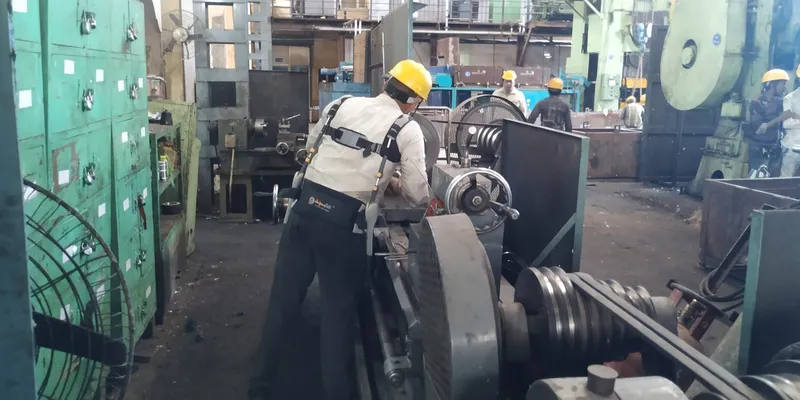Meet Ganesh Ram Jangir, the man behind the famous ‘Jaipur belt’ that cuts load on worker’s spine
The exoskeleton startup, Newndra Innovations, has sold about 300 units to date and has big industrial houses like Maruti Suzuki, BOSCH, Shapoorji Pallonji Group, FM Logistics, Delhivery, and the Indian Army as its clientele.
Despite a range of interventions to reduce its impact, back pain continues to be a major health burden on individuals, employers, and society. It is also incredibly common among industrial workers (mechanics, factory workers, construction workers, etc.), medical professionals, agriculture labourers, warehouse workers, and so on.
In fact, one study found that more than 60 percent of industrial workers experience lower back pain regularly.
A similar concern was echoed in Newndra village of Rajasthan’s Nagaur district. Working with his parents in the family-owned Bajra fields after school, 18-year-old Ganesh Ram Jangir often complained of severe back pain, an issue overlooked by the majority of the farmers in the village.
He spoke to his parents and found that they have been living with back pain for years and resorted to painkillers and back massages for relief. They refused to seek medical help, saying it would hamper work in the fields.
“What will a doctor do? Will he come here and contribute to our work? The problem is there but you have to deal with it,” they said and continued to work in pain.
The incident evoked Ganesh, who had no background in business or manufacturing, to find a permanent solution that would reduce the pressure on the backbone.
“Musculoskeletal pain is the number one cause of work-related disabilities, and it costs more than 300 million to the industrial workers worldwide. It affects their efficiency, productivity, and their livelihood. Due to the many side-effects of painkillers, substance abuse, physical disability, and work absenteeism, the sufferers’ whole family has to suffer. These problems cost billions to the Industrial sectors,” says Ganesh, who started exploring the idea of building an exoskeleton that minimises strain and injury by providing lift support, weight dispersion, posture correction, and other capabilities.
After eight years of dedication, the social entrepreneur launched ‘Newndra Innovations’ in 2016 and built its flagship product, JaipurBelts, an unpowered and lightweight exoskeleton, which reduces the load on the spine by over 50 percent.
The exoskeleton received its patent in 2019 across nine countries and was set out for sale. It has sold over 300 units to industrial and MSME workers, agriculture and construction workers, back and spinal patients, aged people, among others. Its major clientele includes large corporations, including Maruti Suzuki, BOSCH, Shapoorji Pallonji Group, FM Logistics, Delhivery, and the Indian Army.
The belts are exclusively sold on the company’s website, but will soon be available on ecommerce websites, equipment stores, and other channels as the resources build-up, the founder says.

A factory worker wearing JaipurBelt.
Maintaining the ‘balance’
Ganesh spent most of his time working on the solution while pursuing his engineering degree at Jaipur Engineering College and Research Centre.
However, striking a balance between academia and personal innovation was becoming more and more challenging.
“It immediately started working on my idea after school. I was not well-versed with terms like innovation, startup, ideations, etc., and hailed from a humble family of carpenters and farmers. I had no industrial connection and struggled a lot in developing the product. But I had the courage,” says Ganesh.
Despite all the odds, the entrepreneur managed to create a prototype by his final semester.
“I came up with a wooden prototype of the JaipurBelt and approached Professor Anil Gupta from National Innovation Foundation (NIF), who agreed to help me in all manner possible to perfect the model,” says Ganesh, who received a demand draft of Rs 3,000 from NIF to work on the prototype.
The entrepreneur struggled to dedicate time to the prototype as he had to pick up a job to financially support his family. He worked with Tata Consultancy service (TCS) for three years before calling it quits to launch his startup Newndra Innovations in 2016.
“I had a lot of financial pressure, but the desire to do something for people kept biting me. My family was ready to support my decision but it was a hard choice due to the financial constraints. I gathered courage and finally resigned in 2016 to work on the final prototype,” says Ganesh.
The momentum was built after the prototype received a grant at an Indo-US fund technology forum after winning a competition. “That was a big push,” the founder says.
The money was used to prototype, design, and develop JaipurBelt, which received its patent in 2019 across India, the USA, China, Russia, and Europe, and was officially launched.
With nine patents across territories, the company has sold about 300 units to date, and a majority of customers are factory workers in large corporations, including Maruti Suzuki, BOSCH, Shapoorji Pallonji Group, FM Logistics, Delhivery, and in the Indian Defence.
“Wherever manual work or human bending is involved, we find our user case. It could be in agriculture, construction, automobile assembly line or even the defence sector. There are soldiers in Jammu and Kashmir who are using the belts as they move across uneven surfaces and face a lot of back issues,” he says.
Parts of the exoskeleton are outsourced while the design, assembly, and testing take place at an in-house facility in Jaipur.
The startup has Dr Anil Jain from Santokba Durlabhji Memorial Hospital (SDMH) and Dr Alok Pandya from JECRC University in Jaipur as advisors.
Taking pride
Ganesh takes a lot of pride in his innovation and the social value created out of the business. The social entrepreneur took inspiration from the renowned ‘Jaipur Foot’ and had set out to create a similar impact.
“We are among the first few companies in the world who started working on this idea. There were hardly any exoskeleton companies back in 2008 when we started,” he says.
Claiming to be the world’s most efficient, affordable, and lightweight exoskeleton, the founder says the belt is able to cut load by almost 50 percent, and hence doubles a person’s capacity to bend or lift. It is adjustable to different ergonomics and anthropometry.
It weighs 1.5 kg, which is 4.5 kg lighter than other exoskeletons and is priced at $100.
“Foreign companies are selling similar products at an exorbitant price of Rs 1.5 to 2 lakh. Beyond pricing, we work with the end users unlike other companies. I myself suffered from this occupational hazard and developed the product. The other companies exist only because there is a market,” says Ganesh.
The startup has collaborated with IIT Ropar; Kasturba Medical College, Mangalore; SDMH Jaipur Indian Spinal Hospital, New Delhi; and an associated incubate of Venture Centre, Pune.
Innovation 2.0
Besides its flagship product, the company is developing a range of exoskeletons like ArmMax for assembly line workers, IndoKnee for people facing knee problems or difficulty in movement.
“Individually, they cost less than a single MRI, weighs equivalent to cloths/bike helmets, increase workers’ efficiency up to 2x while allowing all mobility and without any external power,” Ganesh says.
“We are making exoskeletons, which are actually helping people with disabilities. Right now we are focusing on unpowered devices and will get into powered exoskeletons soon. They will be costlier but then we can help people who have paralysis or people who have severe back problems,” he adds.
The startup is targeting worker-intensive companies like auto, manufacturing, and construction, and will be moving to Germany and the US market soon.
“We want to be one of the leading companies in exoskeleton space but the aim is to reach all groups of people. The product is limited due to the price and we will continue to innovate to make it affordable for all,” says Ganesh.
YourStory’s flagship startup-tech and leadership conference will return virtually for its 13th edition on October 25-30, 2021. Sign up for updates on TechSparks or to express your interest in partnerships and speaker opportunities here.
For more on TechSparks 2021, click here.
Applications are now open for Tech30 2021, a list of 30 most promising tech startups from India. Apply or nominate an early-stage startup to become a Tech30 2021 startup here.
Edited by Megha Reddy








